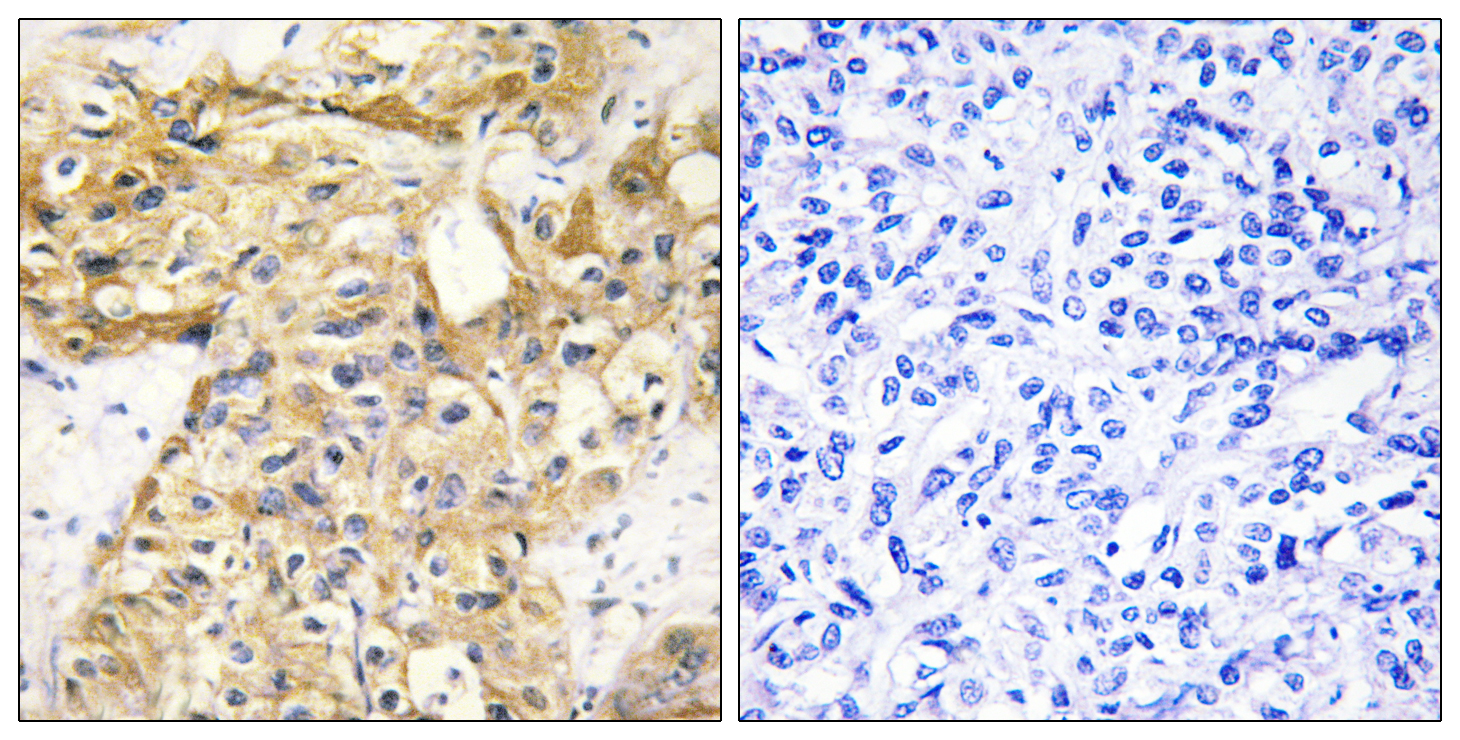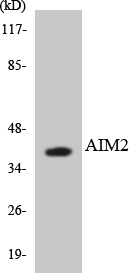COL18A1 Polyclonal Antibody
- Catalog No.:YT1016
- Applications:IHC;IF;ELISA
- Reactivity:Human;Mouse
- Target:
- COL18A1
- Fields:
- >>Protein digestion and absorption
- Gene Name:
- COL18A1
- Protein Name:
- Collagen alpha-1(XVIII) chain
- Human Gene Id:
- 80781
- Human Swiss Prot No:
- P39060
- Mouse Gene Id:
- 12822
- Mouse Swiss Prot No:
- P39061
- Immunogen:
- The antiserum was produced against synthesized peptide derived from human Collagen XVIII alpha1. AA range:801-850
- Specificity:
- COL18A1 Polyclonal Antibody detects endogenous levels of COL18A1 protein.
- Formulation:
- Liquid in PBS containing 50% glycerol, 0.5% BSA and 0.02% sodium azide.
- Source:
- Polyclonal, Rabbit,IgG
- Dilution:
- IHC 1:100 - 1:300. IF 1:200 - 1:1000. ELISA: 1:5000. Not yet tested in other applications.
- Purification:
- The antibody was affinity-purified from rabbit antiserum by affinity-chromatography using epitope-specific immunogen.
- Concentration:
- 1 mg/ml
- Storage Stability:
- -15°C to -25°C/1 year(Do not lower than -25°C)
- Other Name:
- COL18A1;Collagen alpha-1(XVIII) chain
- Molecular Weight(Da):
- 178kD
- Background:
- This gene encodes the alpha chain of type XVIII collagen. This collagen is one of the multiplexins, extracellular matrix proteins that contain multiple triple-helix domains (collagenous domains) interrupted by non-collagenous domains. A long isoform of the protein has an N-terminal domain that is homologous to the extracellular part of frizzled receptors. Proteolytic processing at several endogenous cleavage sites in the C-terminal domain results in production of endostatin, a potent antiangiogenic protein that is able to inhibit angiogenesis and tumor growth. Mutations in this gene are associated with Knobloch syndrome. The main features of this syndrome involve retinal abnormalities, so type XVIII collagen may play an important role in retinal structure and in neural tube closure. Alternative splicing results in multiple transcript variants. [provided by RefSeq, Dec 2014],
- Function:
- disease:Defects in COL18A1 are a cause of Knobloch syndrome (KNO) [MIM:267750]. KNO is an autosomal recessive disorder defined by the occurrence of high myopia, vitreoretinal degeneration with retinal detachment, macular abnormalities and occipital encephalocele.,function:COLA18A probably plays a major role in determining the retinal structure as well as in the closure of the neural tube.,function:Endostatin potently inhibits endothelial cell proliferation and angiogenesis. May inhibit angiogenesis by binding to the heparan sulfate proteoglycans involved in growth factor signaling.,polymorphism:There is an association between a polymorphism in position 1675 and prostate cancer. Heterozygous Asn-1675 individuals have a 2.5 times increased chance of developing prostate cancer as compared with homozygous Asp-1675 individuals.,PTM:Prolines at the third position of the tripeptide repeating un
- Subcellular Location:
- Secreted, extracellular space, extracellular matrix . Secreted, extracellular space, extracellular matrix, basement membrane .; [Non-collagenous domain 1]: Secreted, extracellular space, extracellular matrix, basement membrane . Secreted .; [Endostatin]: Secreted . Secreted, extracellular space, extracellular matrix, basement membrane .
- Expression:
- Present in multiple organs with highest levels in liver, lung and kidney.
- June 19-2018
- WESTERN IMMUNOBLOTTING PROTOCOL
- June 19-2018
- IMMUNOHISTOCHEMISTRY-PARAFFIN PROTOCOL
- June 19-2018
- IMMUNOFLUORESCENCE PROTOCOL
- September 08-2020
- FLOW-CYTOMEYRT-PROTOCOL
- May 20-2022
- Cell-Based ELISA│解您多样本WB检测之困扰
- July 13-2018
- CELL-BASED-ELISA-PROTOCOL-FOR-ACETYL-PROTEIN
- July 13-2018
- CELL-BASED-ELISA-PROTOCOL-FOR-PHOSPHO-PROTEIN
- July 13-2018
- Antibody-FAQs
- Products Images

- Immunofluorescence analysis of A549 cells, using Collagen XVIII alpha1 Antibody. The picture on the right is blocked with the synthesized peptide.

- Immunohistochemistry analysis of paraffin-embedded human liver carcinoma tissue, using Collagen XVIII alpha1 Antibody. The picture on the right is blocked with the synthesized peptide.

- Western blot analysis of the lysates from HeLa cells using AIM2 antibody.



